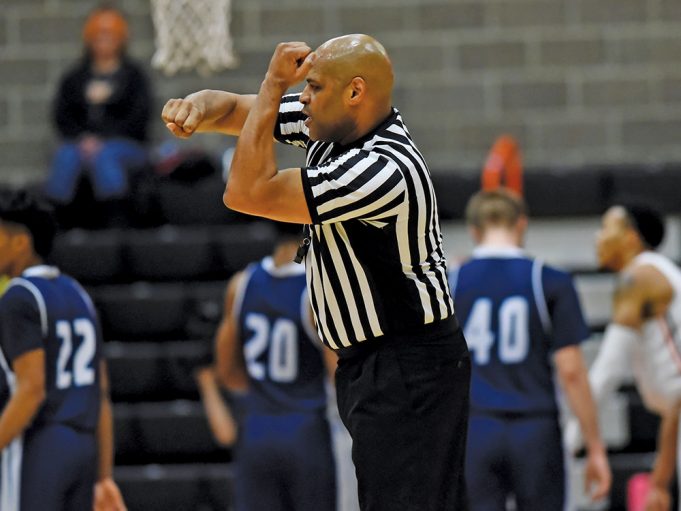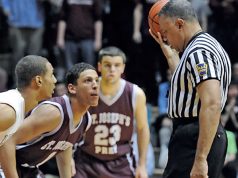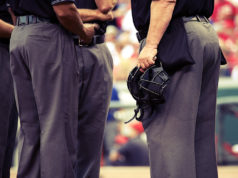The trouble with learning to officiate is that almost the entire focus is on recognizing fouls and calling them. Therefore, beginners not only concentrate on where to stand, but will also find that intense observation takes on an importance of its own, and that importance becomes one of discovering participants’ behavior that is illegal under the rules.
Such concentration can turn officials into police officers, believing their job is to arrest transgressors. The emphasis on detection also means that it is possible for officials to operate as though their game is the one being played and not the one going on between opponents.
Don’t go into the game “looking” for fouls
Why do vast numbers of officials behave in that way, overeager to call fouls? It’s the way they were “brought up,” in a manner of speaking. They go out onto the field or court looking for fouls.
The rulebook helps them. It defines violations very precisely. The same with any act of body contact: tripping, holding, obstruction, charging, etc. It takes many games of officiating for an astute practitioner to understand that fine distinctions must be made for a game to be handled smoothly and fairly. A slow learner may never reach that point at all.
There are natural intervals in a game when things are stopped, an interruption in the flow occurs and officials are well-advised to acknowledge that interruption by not being too hasty in resuming action. Don’t intrude yourself upon the game unnecessarily. The overall premise is simply this: The main purpose of officials should be to help two teams play a game fairly and smoothly. That’s a solid, all-encompassing philosophy under which to operate.
There is an often-quoted officiating slogan, “See a foul, call a foul.” The sooner you get that slogan out of your head, the sooner you’ll be on your way to becoming a superior official.
Officials can help players line up, and they should do so softly and crisply. Officials should talk a lot, to players as well as to each other, aiding players in reasonable ways. Addressing players should be done in moderated language, conversational in tone and in word choice. You gain a lot more respect and compliance with a gentle approach.
Officials are admonished to “see the whole play” before ruling that contact was illegal. Often, however, they haven’t really seen the whole play but instead think they have. You can’t just call things on impulse and still be a good official.
The obvious fouls are pretty easy to call if you see them. If you’ve taken your eyes off what should be your primary responsibility, you may not see them. Make primary responsibility prime. That is sound philosophy.
Now, if contact occurs slightly away from the play and if its legality is questionable, that is an item you should talk over with fellow officials to see if you can reach a consensus on an equitable and consistent course of action, a philosophy you can defend with a clear conscience.
What's Your Call? Leave a Comment:
Note: This article is archival in nature. Rules, interpretations, mechanics, philosophies and other information may or may not be correct for the current year.
This article is the copyright of ©Referee Enterprises, Inc., and may not be republished in whole or in part online, in print or in any capacity without expressed written permission from Referee. The article is made available for educational use by individuals.
















